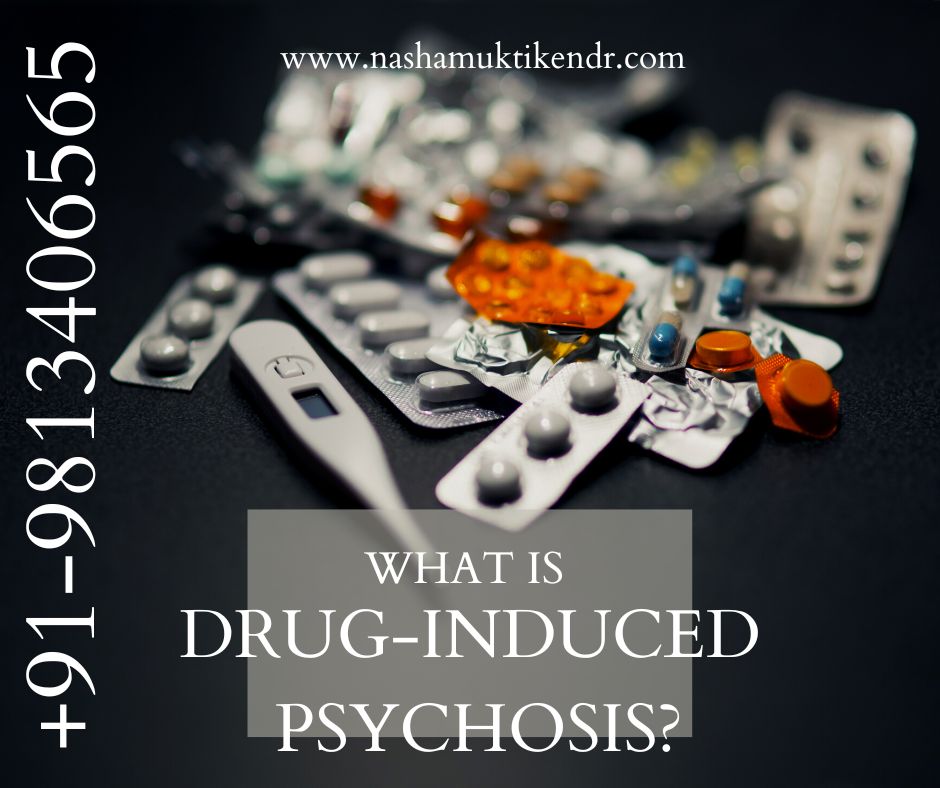What is Drug-Induced Psychosis?
Alcohol, marijuana, hallucinogens, and other drugs can cause drug-induced psychosis, also known as substance-induced psychotic disorder. This serious disease can develop after using these drugs. Symptoms of the disorder resemble those of primary psychotic disorders like schizophrenia or bipolar disorder. The causes, signs, and treatments of drug-induced psychosis will be covered in this blog.
Causes of Drug-Induced Psychosis | Golden Future Welfare Society
Many substances, including stimulants, hallucinogens, and depressants, can cause drug-induced psychosis. It is unclear what causes drug-induced psychosis exactly. Yet, it is thought that the disease is brought on by how medicines affect the neurotransmitters in the brain, which are in charge of facilitating communication between brain cells.
The use of stimulant substances, such as cocaine and amphetamines, is one of the key contributors to drug-induced psychosis. These medications raise dopamine levels in the brain, which can cause hallucinations, delusions, and other psychotic symptoms.
Drug-induced psychosis can also result from hallucinogens like LSD and mushrooms. The serotonin receptors in the brain are impacted by these medications, which might disrupt perception and cause hallucinations.
Another type of drug-induced psychosis is alcohol-induced psychosis. Alcoholism that is sustained over time can harm the brain and cause a variety of psychiatric symptoms, such as hallucinations and delusions.
Symptoms of Drug-Induced Psychosis
The type of substance used, the length of drug usage, and the person’s underlying mental condition can all affect the symptoms of drug-induced psychosis. The following are a few of the most typical signs of drug-induced psychosis:
- Hallucinations: Perceiving, hearing, or sensing unreal things.
- Delusions: Believing in things that are false or do not have supporting evidence.
- Paranoia: having the impression that someone is trying to hurt you or that you’re being watched or pursued.
- Erratic speech and actions: Having trouble coherently expressing thoughts or ideas and acting in ways that are inappropriate for the circumstance.
- Uncertain thinking: difficulty making judgements and absorbing information.
- emotional turbulence mood swings, such as abrupt transitions from happiness to rage or anxiety.
Diagnosis of Drug-Induced Psychosis
Drug-induced psychosis is diagnosed when there are symptoms present during or soon after drug usage. A healthcare professional will do a complete physical and psychiatric evaluation to identify the disease, which may involve imaging studies, blood testing, and a drug-induced psychosis test.
Excluding other potential causes of psychotic symptoms, such as primary psychotic disorders or underlying medical diseases, is the first step in testing for drug-induced psychosis. A physical examination, a neurological examination, and imaging tests to assess the brain may all be part of the test. The medical professional may also conduct a psychological examination to evaluate the patient’s attitudes, sentiments, and actions.
Drug-Induced Psychosis treatment
The underlying drug usage must be addressed in order to treat drug-induced psychosis, and the patient’s psychological symptoms must be supported. Treatment options can include: depending on the severity of the symptoms and the patient’s medical background.
- Treatment for Drug-Induced Psychosis: The first step in treating drug-induced psychosis is to cease taking the substance causing the symptoms. Depending on the drug(s) being withdrawn from, medical supervision may be necessary to manage the withdrawal’s physical and psychological symptoms.
- Medications: Antipsychotics, antidepressants, and anxiety medicines, among others, can be used to treat the symptoms of drug-induced psychosis. Hallucinations, delusions, and anxiety symptoms can all be helped by taking these drugs.
- Psychotherapy: As a form of talk therapy, psychotherapy can assist people experiencing drug-induced psychosis in addressing their underlying mental health concerns and acquire coping mechanisms to control their symptoms. Drug-induced psychosis is typically treated with cognitive-behavioural therapy (CBT), a popular form of psychotherapy.
- Supporting care: To help manage their symptoms and enhance their quality of life, people with drug-induced psychosis may need supportive care. In order to help the person manage their symptoms, this can involve social support as well as assistance with daily tasks like meal preparation and hygiene.
- Hospitalization: To control the patient’s symptoms and protect their safety in cases of severe drug-induced psychosis, hospitalization may be required. If someone has suicidal or homicidal thoughts, poses a threat to themselves or others, or cannot take care of themselves, hospitalization may be necessary.
Outlook for Drug-Induced Psychosis
The type of drug used, the intensity and persistence of symptoms, as well as the person’s underlying mental condition all affect the prognosis for drug-induced psychosis. As drug usage is stopped, drug-induced psychosis may occasionally go away on its own. In other situations, the symptoms can continue long after drug usage stops, resulting in permanent drug-induced psychosis.
A rare but severe variant of the illness called permanent drug-induced psychosis can cause cognitive decline, hallucinations, and delusions, among other chronic psychiatric symptoms. Long-term pharmaceutical use and continuous psychotherapy may be used to treat drug-induced permanent psychosis.
Prevention of Drug-Induced Psychosis
The best defence against drug-induced psychosis is to abstain from using substances that can lead to the condition. This includes alcohol, illegal narcotics, and medications on prescription. Those with a history of psychiatric illnesses or a family history of mental disease should use drugs with extra caution since they may be more likely to experience drug-induced psychosis.
Drug usage, particularly the use of stimulants, hallucinogens, and depressants, can lead to drug-induced psychosis, a dangerous condition. Symptoms of the disorder resemble those of primary psychotic disorders like schizophrenia or bipolar disorder. Drug-induced psychosis is diagnosed when there are symptoms present during or soon after drug usage. In order to treat drug-induced psychosis, the underlying drug usage must be addressed, and the patient’s psychological symptoms must be supported. The best defence against drug-induced psychosis is to abstain from using substances that can lead to the condition. To guarantee a good diagnosis and course of treatment, it’s crucial to seek medical help as soon as you or someone you know exhibits signs of drug-induced psychosis.
How does Nasha Mukti Kendra help drug-induced psychosis patients?
A specialist rehabilitation facility that helps people with drug-induced psychosis is called Nasha Mukti Kendra. They offer a secure and encouraging setting where patients can get help for their psychiatric issues. By placing clinical psychologists in their facilities, Nasha Mukti Kendra assists patients with drug-induced psychosis in a variety of methods. These psychologists are qualified to identify and manage a variety of mental health conditions, including psychosis brought on by drugs.
In addition, Nasha Mukti Kendra differs greatly from other rehabilitation facilities. They offer therapy that is established in America and is also referred to as “love and care therapy.” This method focuses on treating addiction as a sickness and fostering an environment where the patient can develop confidence in the rehab programme. Moreover, Nasha Mukti Kendra offers public areas for yoga, meditation, and other leisure pursuits to aid patients in unwinding and managing their symptoms.
Also, Nasha Mukti Kendra employs licenced therapists with particular training in treating drug-induced psychosis. They employ evidence-based procedures and tried-and-true treatments to aid individuals in overcoming their illnesses. The fact that Nasha Mukti Kendra celebrates all holidays and special occasions on-site ensures that patients won’t feel confined or lonely while they’re there.
In general, Golden Future Welfare Society Nasha Mukti Kendra Yamunanagar is a great resource for those with drug-induced psychosis. They offer a thorough, all-encompassing form of care that takes into account the patient’s physical, mental, and emotional requirements. Patients can rehabilitate and regain control of their lives with the aid of professional therapy, encouraging care, and a secure atmosphere.

